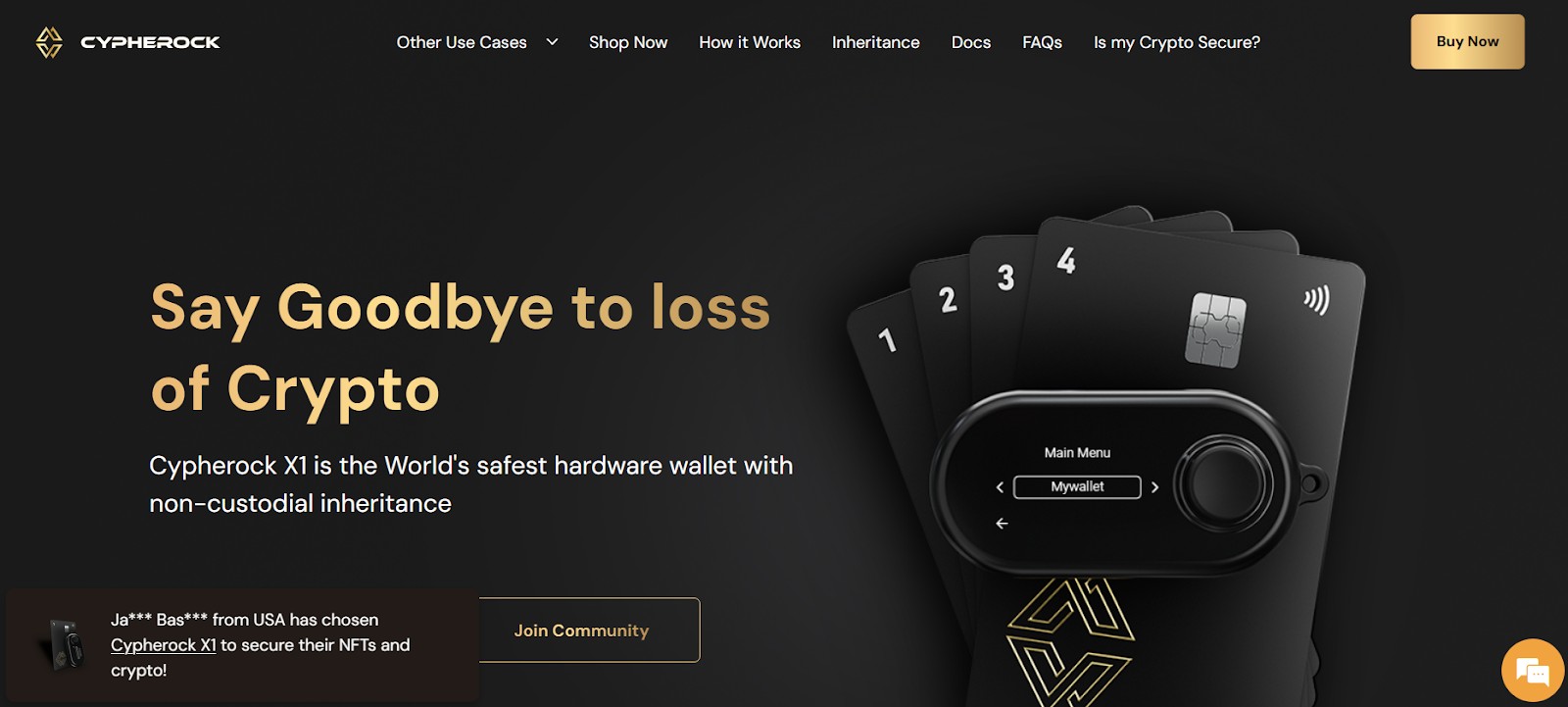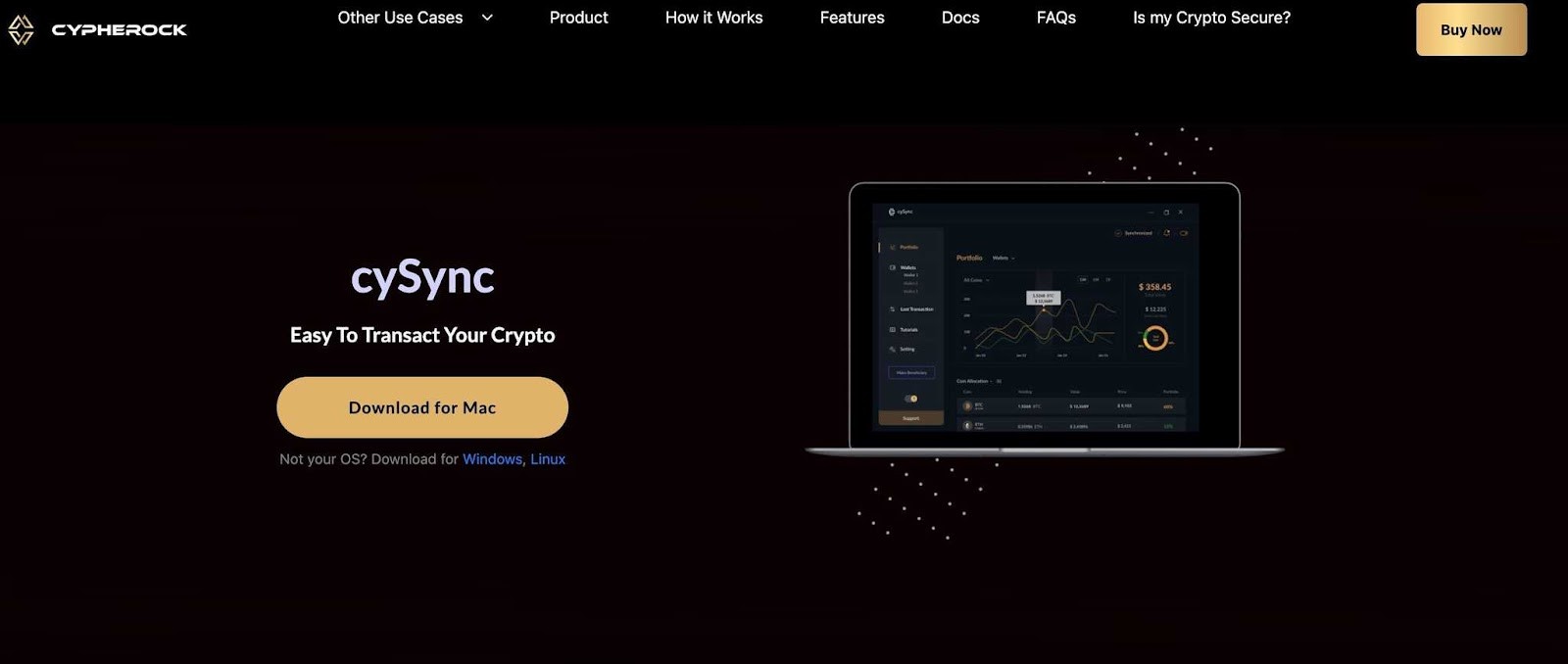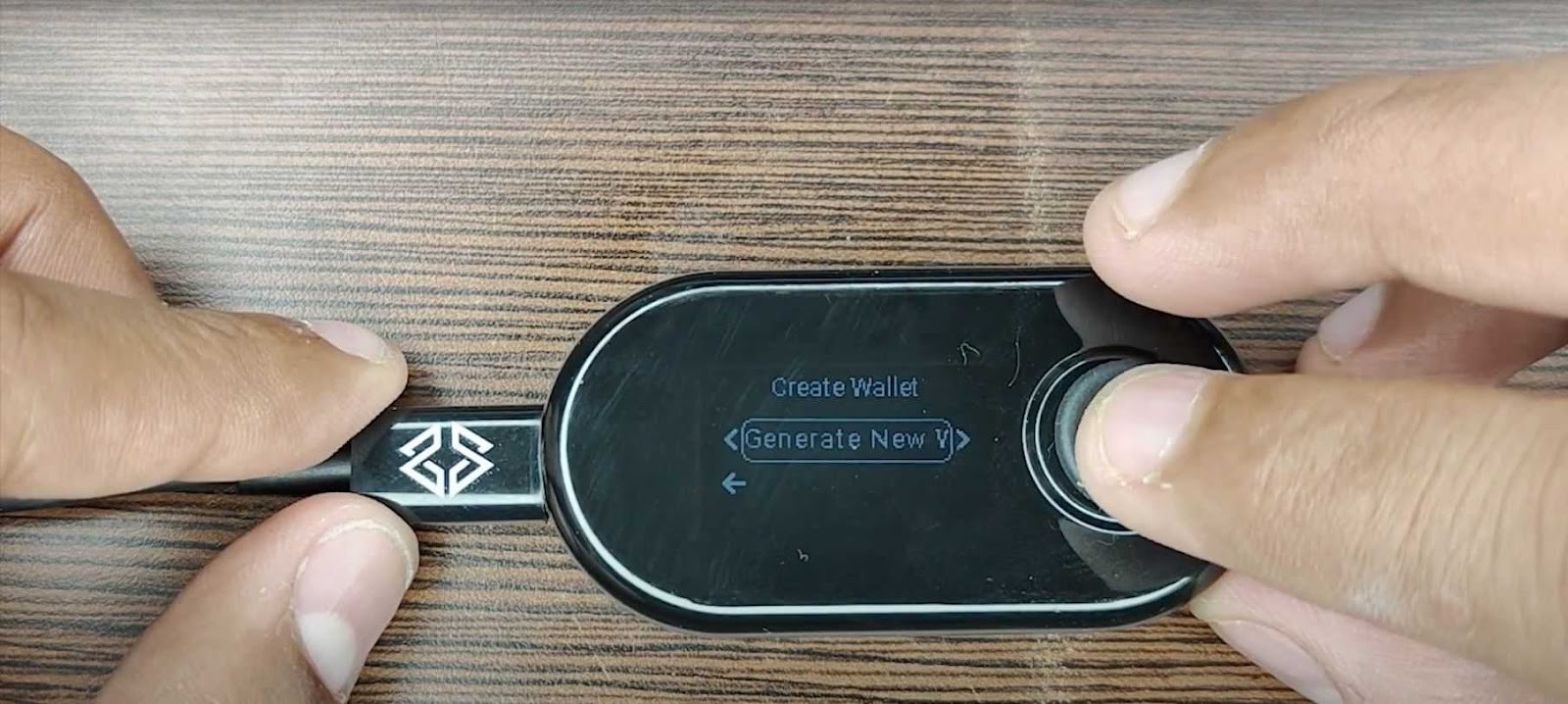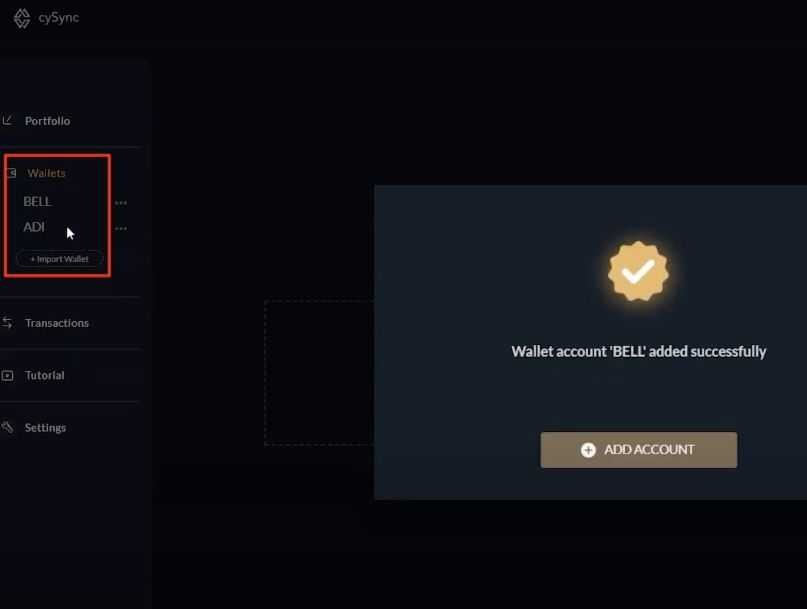Cypherock Wallet Review 2025



Editorial Note: While we adhere to strict Editorial Integrity, this post may contain references to products from our partners. Here's an explanation for How We Make Money. None of the data and information on this webpage constitutes investment advice according to our Disclaimer.
Cypherock Wallet is a highly secure cold storage solution using Multi-Party Computation (MPC) and an X-Card-based recovery system. It removes single points of failure, offering users offline protection, multi-signature backups, and strong security features without needing constant internet access.
If you're looking for a modern hardware wallet that prioritizes both security and usability, Cypherock Wallet might catch your attention. In a world of rising crypto theft and lost keys, it brings a fresh approach to cold storage — without depending on traditional seed phrases or single-device setups.
This article explores how Cypherock stands out from the competition with its innovative tech stack, practical app integration, and robust safety layers. Let’s dive into everything you need to know before making a decision.
Risk warning: Cryptocurrency markets are highly volatile, with sharp price swings and regulatory uncertainties. Research indicates that 75-90% of traders face losses. Only invest discretionary funds and consult an experienced financial advisor.
Cypherock wallet overview
The Cypherock X1 is an innovative hardware wallet designed to provide top-tier security for crypto assets. Unlike traditional wallets that store private keys in a single location, the Cypherock X1 utilizes Shamir's Secret Sharing to split the private key into five encrypted shards.

These shards are distributed across the X1 Vault (the main hardware device) and four X1 Cards (NFC-enabled smart cards). To authorize a transaction, users need the X1 Vault and any one of the X1 Cards, ensuring that no single component holds the entire private key.
| Feature | Details |
|---|---|
| Wallet Type | Cold storage using MPC and X-Card recovery |
| Key Features | Offline security, multi-signature backup |
| Supported Coins | BTC, ETH, ERC-20 tokens |
| Security Chip | EAL6+ Secure Element |
| Price | Approximately $159 (€149 or £129) for the standard package, which includes the X1 Vault, four X1 Cards, and a hard case |
| Best For | Long-term holders and security-focused users |
Key features of Cypherock wallet
Before getting started, get to know about the main features of the Cypherock wallet:
Multi-party key security through key splitting
Cypherock X1 takes a different approach from regular wallets by splitting your private key into five parts. One part stays inside the X1 Vault (the main hardware device), and the other four are stored across NFC-enabled X-Cards. You only need the Vault and any one of the cards to approve transactions. This system keeps your keys secure even if one or two parts are lost or compromised. It's especially helpful for long-term holders and those planning inheritance or multi-user access.
No seed phrase, smart recovery system
Forget the stress of storing seed phrases. Cypherock’s recovery method is based on collecting any three of the five key parts to regain access to your wallet. If you lose a card, you’re still safe. There’s no need to write anything down or store anything online, which makes this system safer against hacks and accidental loss. It’s a huge relief for anyone who doesn’t want to rely on paper backups.
Fully offline and air-gapped usage
Cypherock X1 stays disconnected from the internet entirely. It has no Bluetooth, Wi-Fi, or wireless features. All activity is done through a USB-C cable, keeping it air-gapped and safe from remote hacks, phishing, or malware. This makes it a serious cold wallet for those who want top-tier offline protection.
Works smoothly with companion app
Even with all that offline security, you’re not stuck with a clunky experience. Cypherock syncs with its desktop app for checking balances, transferring crypto, and managing tokens — all while keeping the signing process on the hardware itself. It’s a smart balance between usability and security.
Supports hundreds of coins and tokens
Cypherock works with a wide range of cryptocurrencies, including Bitcoin, Ethereum, ERC-20 tokens, BNB, Polygon, Litecoin, and many others. You can also add custom tokens using the app by entering token contract details, so it’s flexible enough for most portfolios.
Secure hardware and transparent code
The wallet is built with high-grade, tamper-resistant chips certified for security. On top of that, it runs on open-source firmware, so the community can inspect and verify how it works. This gives users confidence that the system doesn’t rely on black-box security.
Intuitive controls and screen
The X1 Vault comes with a bright OLED display and a small joystick that makes navigation easy. You can view, approve, and sign transactions without feeling lost in a complicated interface. It's designed with simplicity and clarity in mind.
Pros and cons of Cypherock wallet
- Pros
- Cons
MPC security eliminates single points of failure.
No seed phrase needed.
Air-gapped for full offline security.
Easy-to-use app with clean interface.
Tamper-resistant design with high-grade chip.
Ideal for inheritance planning and secure recovery.
Slightly higher price than entry-level wallets.
Requires understanding of X-Card system for full use.
Limited coin support compared to some competitors.
Setup process can be intimidating for beginners.
Cypherock security review
Decentralized key storage using Shamir’s Secret Sharing
One of the most unique aspects of Cypherock’s security is its use of Shamir’s Secret Sharing to split your private key into five parts. These parts are distributed across the main hardware device (X1 Vault) and four separate X1 Cards. No single device holds the complete key. To authorize any transaction, you only need two of the five components.
No seed phrase, no single point of failure
Traditional wallets rely on seed phrases — one of the weakest links in crypto security. Cypherock eliminates this entirely. There’s no seed to write down, memorize, or hide. Instead, recovery is based on accessing any three of the five key shares.
Strong protection against both physical and remote attacks
Cypherock X1 takes a layered approach to security:
Tamper resistance. Both the X1 Vault and X1 Cards are built with EAL6+ secure elements, providing top-tier defense against hardware tampering or physical attacks.
Air-gapped design. The device has no Wi-Fi, Bluetooth, or wireless functionality. Everything is done offline using a USB-C cable.
Side-channel attack resistance. Its hardware architecture includes multiple chips that prevent attackers from inferring sensitive data through timing or electromagnetic patterns.
How to use Cypherock Wallet: A step-by-step guide
Go through these steps to set up and use your wallet perfectly:
Step 1: Unbox and set up the Wallet
Start by unboxing the X1 wallet and four X-Cards. Plug the wallet into your computer and follow the instructions on the screen to begin the setup process. You’ll be prompted to choose a PIN and optionally a passphrase. The wallet will then generate and distribute your key shares across the cards and devices.

Step 2: Backup with X-cards
During setup, each X-Card is initialized with part of your private key. Label and store them securely in different locations for redundancy and protection. You can always use any three of the five pieces (including the X1) for full recovery, so losing one or two won’t be a problem.

Step 3: Install the mobile app
Download the Cypherock app from Google Play or the App Store. Link the app with your wallet using USB-C or a secure on-screen process. The app will allow you to manage coins, send/receive crypto, and monitor your portfolio — all while keeping your keys safely offline.

Step 4: Send and receive crypto
To receive crypto, use the app to generate a public address. Share it safely with the sender. To send crypto, enter recipient details in the app, then confirm on the X1 device. All signing is done offline, so your keys never touch the internet. This guarantees top-level safety for every transaction.

Alternatives to Cypherock Wallet
If you are looking for wallets other than Cypherock, here are some of its best alternatives:
ELLIPAL Titan
ELLIPAL Titan is a fully air-gapped wallet that uses QR codes for data transfer. It doesn’t support MPC but is great for users wanting strong offline isolation. The device is durable and mobile-friendly but still relies on seed phrases, which Cypherock avoids.
Trezor Model T
Trezor Model T is one of the oldest and most trusted cold wallets. It supports a wide range of coins and features a touchscreen for easier use. However, it doesn’t offer the same level of distributed recovery or multi-party computation. It’s best for users who want convenience over redundancy.
Ledger Nano X
Ledger Nano X is popular for mobile users and supports Bluetooth connectivity. It offers a smooth app experience and supports 5,500+ coins. But it’s not air-gapped and still depends on a seed phrase. For high-security storage, Cypherock offers stronger isolation.
Storing crypto on exchanges: An alternative to wallets
Keeping your crypto on centralized exchanges is a common choice for many users due to its convenience. It allows quick access for trading and eliminates the need to manage private keys manually. However, this convenience comes with notable risks.
When you store assets on an exchange, you're trusting a third party to safeguard your funds. If the platform faces a security breach or becomes insolvent, your assets could be locked or lost entirely. This is why hardware wallets and other cold storage methods are generally recommended for long-term holding and larger investments.
To help you compare your options, we’ve put together a carefully selected list of trusted crypto exchanges based on security, usability, and overall reliability.
| Foundation year | Min. Deposit, $ | Spot Taker fee, % | Spot Maker Fee, % | Deposit fee | Withdrawal fee | Demo account | Regulation | TU overall score | Open an account | |
|---|---|---|---|---|---|---|---|---|---|---|
| 2017 | 10 | 0,1 | 0,08 | No | 0,0004 BTC 2,6 USDT | Yes | No | 8.9 | Open an account Your capital is at risk. |
|
| 2011 | 10 | 0,4 | 0,25 | No | 0,0005 BTC | No | No | 8.48 | Open an account Your capital is at risk. |
|
| 2016 | 1 | 0,5 | 0,25 | No | 0,0005 BTC | No | Malta Financial Services Authority | 8.36 | Open an account Your capital is at risk. |
|
| 2018 | 1 | 0,2 | 0,1 | No | 0-0,1% | Yes | No | 7.41 | Open an account Your capital is at risk. |
|
| 2004 | No | 0 | 0 | No | No | No | No | 7.3 | Open an account Your capital is at risk. |
Why trust us
We at Traders Union have over 14 years of experience in financial markets, evaluating cryptocurrency exchanges based on 140+ measurable criteria. Our team of 50 experts regularly updates a Watch List of 200+ exchanges, providing traders with verified, data-driven insights. We evaluate exchanges on security, reliability, commissions, and trading conditions, empowering users to make informed decisions. Before choosing a platform, we encourage users to verify its legitimacy through official licenses, review user feedback, and ensure robust security features (e.g., HTTPS, 2FA). Always perform independent research and consult official regulatory sources before making any financial decisions.
Learn more about our methodology and editorial policies.
Using Cypherock for inheritance and multi-layered crypto security
Most beginners think the best wallet is the one that just “stores coins safely,” but Cypherock flips that idea on its head. What really makes it powerful is its potential for inheritance planning without legal mess. You can store different X-Cards in separate physical locations — or even assign one to a trusted family member — without exposing your entire key.
That means if something ever happens to you, someone can recover your crypto without needing to dig through a seed phrase or deal with a lawyer. It’s security and succession planning rolled into one, and very few wallets offer that kind of flexibility.
Another hidden gem is how Cypherock helps reduce overexposure risk during a wallet breach. Since the private key is split across multiple elements, even if someone gets their hands on one X-Card or the Vault, they still can’t access your funds. But here’s the next-level trick: use different X-Cards for different portfolios.
Store one set for long-term cold storage and another for mid-term holdings. By segmenting assets across multiple secure cards, you don’t just avoid theft — you create multiple defense layers without managing multiple wallets.
Conclusion
Cypherock Wallet offers a serious upgrade for anyone looking to secure crypto assets without relying on seed phrases. Its use of Multi-Party Computation (MPC), offline air-gapped storage, and the X-Card recovery system makes it ideal for long-term holders, inheritance planning, and anyone prioritizing top-tier security.
Unlike most hardware wallets, Cypherock eliminates single points of failure and reduces stress around recovery. While its coin support is still growing, its focus on resilience and decentralization sets it apart. For 2025, Cypherock stands out as one of the best cold storage options for security-conscious crypto investors who value peace of mind.
FAQs
What happens if I forget my PIN or lose all five key parts?
If both your PIN and all five key shares are lost, there is no way to recover your wallet. Cypherock doesn’t store any data or offer cloud backups.
Can I use Cypherock Wallet for a multi-user setup, like shared family access?
Yes. Cypherock’s architecture allows distributing X-Cards among different individuals without compromising the full key. This makes it suitable for multi-user or family-shared scenarios.
How does the Cypherock recovery process work?
Cypherock splits your private key into five shares — four X-Cards and one stored on the device. To recover your wallet, you only need any three of the five key shares.
Can I use Cypherock with MetaMask or other DeFi platforms?
At the moment, direct integration with MetaMask and other DeFi platforms is limited. This means it’s not ideal for users who are actively trading or interacting with DApps.
Related Articles
Team that worked on the article
Alamin Morshed is a contributor at Traders Union. He specializes in writing articles for businesses that want to improve their Google search rankings to compete with their competition. With expertise in search engine optimization (SEO) and content marketing, he ensures his work is both informative and impactful.
Chinmay Soni is a financial analyst with more than 5 years of experience in working with stocks, Forex, derivatives, and other assets. As a founder of a boutique research firm and an active researcher, he covers various industries and fields, providing insights backed by statistical data. He is also an educator in the field of finance and technology.
As an author for Traders Union, he contributes his deep analytical insights on various topics, taking into account various aspects.
Mirjan Hipolito is a journalist and news editor at Traders Union. She is an expert crypto writer with five years of experience in the financial markets. Her specialties are daily market news, price predictions, and Initial Coin Offerings (ICO).
Forex leverage is a tool enabling traders to control larger positions with a relatively small amount of capital, amplifying potential profits and losses based on the chosen leverage ratio.
An investor is an individual, who invests money in an asset with the expectation that its value would appreciate in the future. The asset can be anything, including a bond, debenture, mutual fund, equity, gold, silver, exchange-traded funds (ETFs), and real-estate property.
Bitcoin is a decentralized digital cryptocurrency that was created in 2009 by an anonymous individual or group using the pseudonym Satoshi Nakamoto. It operates on a technology called blockchain, which is a distributed ledger that records all transactions across a network of computers.
Crypto trading involves the buying and selling of cryptocurrencies, such as Bitcoin, Ethereum, or other digital assets, with the aim of making a profit from price fluctuations.
Cryptocurrency is a type of digital or virtual currency that relies on cryptography for security. Unlike traditional currencies issued by governments (fiat currencies), cryptocurrencies operate on decentralized networks, typically based on blockchain technology.






























































































































